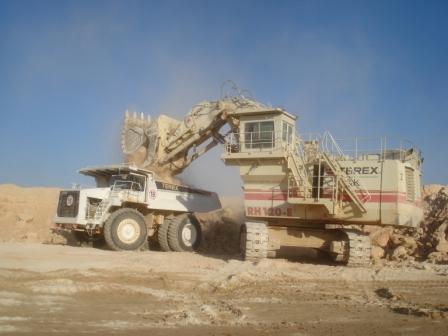Moving Mountains
COMEDAT in Jordan has worked minor miracles to keep its fleet of Terex trucks at the coal or rather the phosphorous face.

COMEDAT in Jordan has worked minor miracles to keep its fleet of Terex trucks at the coal or rather the phosphorous face.
Plants, animals, and people all need phosphorus to function. In the human body, phosphorus plays a critical role in everything from shaping DNA to strengthening teeth. In agriculture, phosphorus acts as fertiliser to improve crop yield. Because phosphorus can’t be artificially produced, it must be mined from phosphorus-rich compounds, or phosphates.
Phosphates are among Jordan’s most abundant natural resources, and phosphate mining is one of the country’s leading industries. The chemical itself is highly toxic to humans making mining a hazardous and difficult occupation.
It is also not too healthy for machines and can be highly corrosive to the machinery used to dig it out of the ground. The fact COMEDAT, Jordan’s largest phosphate mining contractor, has managed to keep their fleet of Terex’ trucks moving for decades makes their operation a minor miracle of mining.
COMEDAT is owned by the Dababneh Family and runs one of the largest fleets of TR100s trucks worldwide. Founded in 1970 to mine phosphate, the company’s current opencast operations generate in excess of 4 million cubic metres of overburden and 800,000 cubic metres of phosphate per month and rely predominantly on Terex rigid trucks to move this vast amount of material.
COMEDAT purchased their first Terex rigid trucks in 1997, and currently operates 75 trucks split between twenty 3311E, five 33100 and 50 TR100 models. Working at the company’s three sites to the South of Amman, the trucks have been purchased principally for their simplicity of design and their durability.
“We have a policy of standardising our equipment and the TR100s were chosen primarily for their reliability, spare parts availability as well as their pricing,” explains Dababneh, COMEDAT’s chairman. “They are, in general, simple and forgiving trucks where failures usually do not turn into a catastrophic failure. This is extremely important to us and reflects very well on our productivity.”
Operating in such a tough environment, the Terex trucks have proven to be a reliable choice for the company. Temperatures in the region vary wildly with summer months reaching a scorching 45o Celsius during the day and dropping to 20 degrees during the night shift whilst the winter months see barely 20o during the day and dipping down to minus 5o at night.
Operating a varied fleet of trucks in a wide age group, the COMEDAT trucks are still giving excellent operational availability. Operating hours of individual units vary between twenty and seventy five thousand hours and despite the age, the trucks are still providing high levels of availability. Keeping the Terex trucks up and running is a straightforward operation with engine rebuilds and transmission overhauls all carried out at the company’s workshops.
Loading the fleet of Terex trucks is taken care of by a total of ten hydraulic mining excavators with bucket capacities between 13m3 and 17m3. The low, wide body fitted to the trucks gives the loader operators an easy target to aim for. Haul distances are generally short for trucks on overburden removal, approximately 750m, whereas trucks carrying low grade phosphate have to travel further, undertaking a journey of 2km, as the material, approximately 18% of the excavated product, is stored close to the pit area. Higher grade material, 6% of the material, is transferred directly to the screening plants located nearer to the processing facility, a distance of approximately 6km from the workings.
The simple, yet robust design of the Terex trucks has impressed both Ms Dabebnah and her staff. The longevity of the Terex design and the quality of the build ensures the COMEDAT trucks will be moving mountains for decades to come.

























